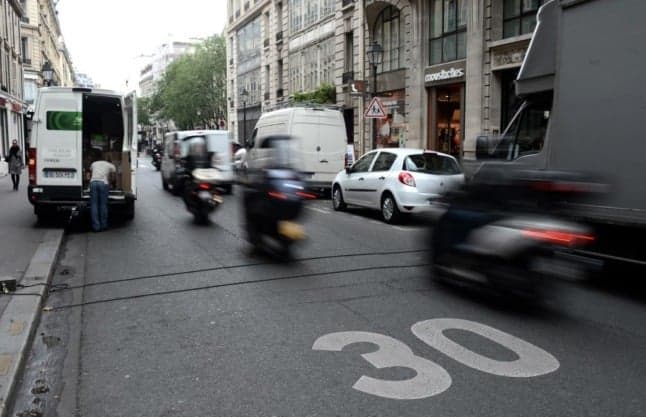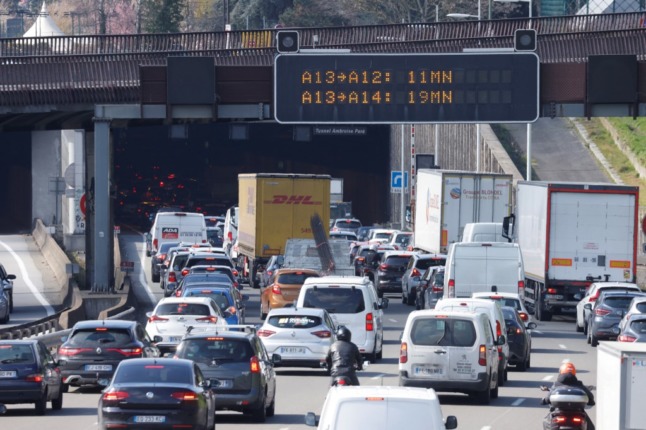ANALYSIS: How much will the new 30km/h speed limit really change Paris?

Monday marks the introduction of a 30km/h speed limit for most of Paris. So what do locals make of the new rules and - in a city renowned for endless traffic jams - how much of a difference will this really make? Sam Bradpiece went to find out.
The Paris mayor has greatly extended the 30km/h (18mph) speed limit zones so that they now cover most streets, with the exception only of large avenues like the Champs-Elysées and the city ringroad.
The mayor's office say the new rule is aimed at reducing accidents and noise pollution while "adapting" the city for the fight against climate change.
“It is a safety measure,” said deputy mayor David Belliard speaking on Franceinfo radio on Monday morning. “You must remember that the great majority of serious or fatal accidents in Paris come from cars or heavy goods vehicles.
"This measure is part of a coherent policy of transformation of the public space - a policy that favours so-called 'soft' modes of mobility like walking, cycling and public transport, to the detriment of cars, which we would like to reserve only for essential use."
The mairie plans to ban most types of private motoring from the central arrondissements of the city from next year.
So will the new measures be enforced, will it make much difference to the famously traffic-choked city and how do residents feel about it?

The city's périphérique ringroad is one of the exceptions to the new 30 km/h and remains, for now, a 50 kmh zone. Photo by Ludovic MARIN / AFP
Support
Ymen Sambe has had countless bad experiences on the roads of the French capital.
“Paris is full of crazy drivers. I was on an electric scooter once and a car rammed me from the side. I didn’t have any serious injuries, but I was left really shocked,” she said.
The 21-year-old student is among the many Parisians backing the expansion of the 30km/h zones. Prior to this, only 60 percent of the city’s roads were subject to such a restriction.
“I am not a driver so my judgement is probably a bit biased but in terms of safety for pedestrians and cyclists, as well as air and noise pollution, it can only be a good thing,” said Chloe Maillard, a 27-year-old consultant living in the capital.
A consultation of close to 6,000 people conducted by City Hall, from October 2020 to November 2020, found that 59 percent of Parisians supported the proposed changes.
A more recent survey by the pollsters IFOP for MisterTurbo.com, found that 61 percent of Parisians were in favour of the new measure, with 71 percent believing that it would be beneficial for the most vulnerable road users.
Enforcement
It remains unclear how stringently the speed limit will be enforced. City Hall said there would be a brief period of ‘tolerance’, but that enforcement ultimately rests in the hands of the police, who have yet to reply to The Local’s request for comment.
According to the local transport statistics agency, the current average speed when driving in central Paris between 7am and 9pm is 11.6 km/h, and 30.9 km/h on the ring road.
The City Authorities believe that implementation of the measure will lead to a 25 percent decrease in the number of road accidents and a 40 percent decrease in those considered serious and fatal.
According to the World Health Organisation the risk of death to a pedestrian hit by a car is 80 percent at 50km/h but just 10 percent at 30km/h.
“There are lots of people who come into hospitals with road traffic injuries,” said Trudy Bouadé, a trainee doctor conducting Covid-19 tests next to Bassin de la Villette in Paris. “Surely this limit is a good thing if it saves lives.”
The City has also argued that expanding the 30km/h limit will cut noise pollution on the roads in half.
Protests
But not everyone is happy with the measure. “The arguments given by the City Hall are false and fallacious,” said François Vallin, President of Rouler Libre - a Paris-based automobile association.
“The more we reduce speed, the more there will be traffic jams. There will be more noise and pollution.”
For Villan, the measure reeks of elite metropolitan virtue signalling. “We have understood that this is just an attempt by the Mayor to win votes at the Presidential election by trying to appear ecological.”
Hidalgo is widely considered to be planning a run for the presidency in 2022, but has not officially declared as a candidate.
The new limit has also exposed a divide between city-dwelling Parisians and Franciliens - residents of the wider Île-de-France region which also includes the Paris suburbs. According to the 2020 consultation from the City Hall, 61 percent of Franciliens were opposed to the new limits.
“Most people who use the roads in Paris come from outside the city. Paris does not belong to the Parisians. It belongs to everyone who uses the roads,” said Vallin, who also highlighted official figures showing that in 2018, only 16 percent of road traffic accidents in Paris were caused by speeding.
Some think the next step will be to ban cars altogether.
“What is the point in having a car? Even electric scooters can now go faster,” said Paris-based baker, Zeimeb Lounissi, who sold her car after learning that the 30km/h speed limit would be implemented more widely.
Rouler Libre plans to launch legal action against the City in September and has planned a protest near the Chateau de Vincennes, just outside of Paris, on Sunday.
Comments
See Also
The Paris mayor has greatly extended the 30km/h (18mph) speed limit zones so that they now cover most streets, with the exception only of large avenues like the Champs-Elysées and the city ringroad.
The mayor's office say the new rule is aimed at reducing accidents and noise pollution while "adapting" the city for the fight against climate change.
“It is a safety measure,” said deputy mayor David Belliard speaking on Franceinfo radio on Monday morning. “You must remember that the great majority of serious or fatal accidents in Paris come from cars or heavy goods vehicles.
"This measure is part of a coherent policy of transformation of the public space - a policy that favours so-called 'soft' modes of mobility like walking, cycling and public transport, to the detriment of cars, which we would like to reserve only for essential use."
The mairie plans to ban most types of private motoring from the central arrondissements of the city from next year.
So will the new measures be enforced, will it make much difference to the famously traffic-choked city and how do residents feel about it?

Support
Ymen Sambe has had countless bad experiences on the roads of the French capital.
“Paris is full of crazy drivers. I was on an electric scooter once and a car rammed me from the side. I didn’t have any serious injuries, but I was left really shocked,” she said.
The 21-year-old student is among the many Parisians backing the expansion of the 30km/h zones. Prior to this, only 60 percent of the city’s roads were subject to such a restriction.
“I am not a driver so my judgement is probably a bit biased but in terms of safety for pedestrians and cyclists, as well as air and noise pollution, it can only be a good thing,” said Chloe Maillard, a 27-year-old consultant living in the capital.
A consultation of close to 6,000 people conducted by City Hall, from October 2020 to November 2020, found that 59 percent of Parisians supported the proposed changes.
A more recent survey by the pollsters IFOP for MisterTurbo.com, found that 61 percent of Parisians were in favour of the new measure, with 71 percent believing that it would be beneficial for the most vulnerable road users.
Enforcement
It remains unclear how stringently the speed limit will be enforced. City Hall said there would be a brief period of ‘tolerance’, but that enforcement ultimately rests in the hands of the police, who have yet to reply to The Local’s request for comment.
According to the local transport statistics agency, the current average speed when driving in central Paris between 7am and 9pm is 11.6 km/h, and 30.9 km/h on the ring road.
The City Authorities believe that implementation of the measure will lead to a 25 percent decrease in the number of road accidents and a 40 percent decrease in those considered serious and fatal.
According to the World Health Organisation the risk of death to a pedestrian hit by a car is 80 percent at 50km/h but just 10 percent at 30km/h.
“There are lots of people who come into hospitals with road traffic injuries,” said Trudy Bouadé, a trainee doctor conducting Covid-19 tests next to Bassin de la Villette in Paris. “Surely this limit is a good thing if it saves lives.”
The City has also argued that expanding the 30km/h limit will cut noise pollution on the roads in half.
Protests
But not everyone is happy with the measure. “The arguments given by the City Hall are false and fallacious,” said François Vallin, President of Rouler Libre - a Paris-based automobile association.
“The more we reduce speed, the more there will be traffic jams. There will be more noise and pollution.”
For Villan, the measure reeks of elite metropolitan virtue signalling. “We have understood that this is just an attempt by the Mayor to win votes at the Presidential election by trying to appear ecological.”
Hidalgo is widely considered to be planning a run for the presidency in 2022, but has not officially declared as a candidate.
The new limit has also exposed a divide between city-dwelling Parisians and Franciliens - residents of the wider Île-de-France region which also includes the Paris suburbs. According to the 2020 consultation from the City Hall, 61 percent of Franciliens were opposed to the new limits.
“Most people who use the roads in Paris come from outside the city. Paris does not belong to the Parisians. It belongs to everyone who uses the roads,” said Vallin, who also highlighted official figures showing that in 2018, only 16 percent of road traffic accidents in Paris were caused by speeding.
Some think the next step will be to ban cars altogether.
“What is the point in having a car? Even electric scooters can now go faster,” said Paris-based baker, Zeimeb Lounissi, who sold her car after learning that the 30km/h speed limit would be implemented more widely.
Rouler Libre plans to launch legal action against the City in September and has planned a protest near the Chateau de Vincennes, just outside of Paris, on Sunday.
Join the conversation in our comments section below. Share your own views and experience and if you have a question or suggestion for our journalists then email us at [email protected].
Please keep comments civil, constructive and on topic – and make sure to read our terms of use before getting involved.
Please log in here to leave a comment.